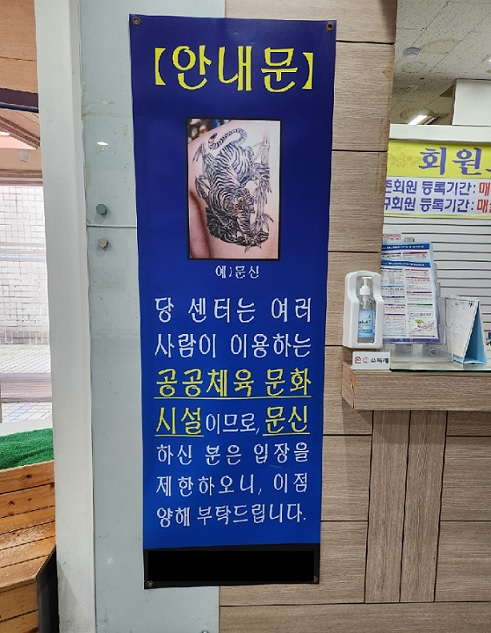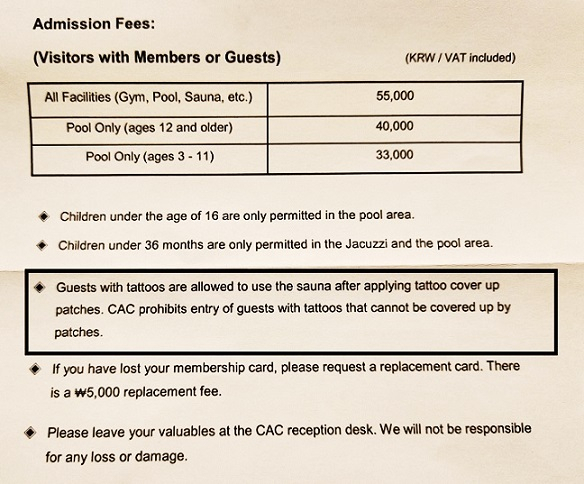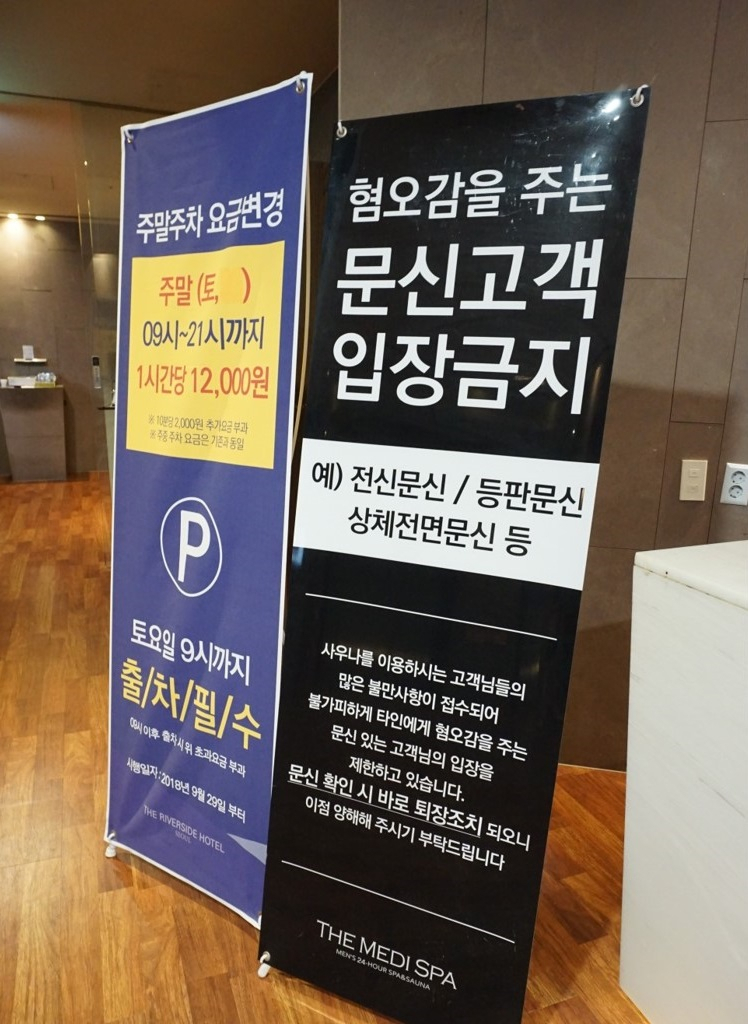'No tattoos allowed here'
Sports facilities, saunas, kids cafes among least tattoo-friendly places in S. Korea
By Choi Jae-heePublished : Oct. 25, 2022 - 14:03

Tattoos were once considered a badge for gangsters in Korea, but they have become a medium of self-expression or a fashion statement among younger generations.
Many are not reluctant to show off their inked skin in public or on social media, but there still persists a societal stigma surrounding the body art.
A sports center in Seodaemun-gu, Seoul, has recently put up a notice that restricts entry of tattooed members. The no-tattoo policy was introduced after complaints from nontattooed members using the swimming pool.
“Parents of young children and the elderly members have complained that encounters with tattooed members cause them unpleasant feelings and could have negative effects on children's education,” an employee there told The Korea Herald.
“The policy is applied to not just the swimming pool, but all fitness facilities here.”
The no-tattoo policy is adopted by some luxury hotels and resorts, as well.
The Westin Josun Seoul requires guests with visible tattoos to cover them with patches to enter the indoor swimming pool.

“All hotel guests are given a written notice stipulating the operating rules of the swimming pool when checking in. The tattoo restriction has been in place for years. The guests with tattoos usually wear a long-sleeved rash guard for the entry,” said a hotel employee, who wished to be unnamed. The same rule is applied to the hotel’s sauna, she added.
Situations at public bathhouses, known as "jjimjilbang," are no different.
One spa facility located in Seoul’s Gangnam district says “no admission for guests with tattoos that displease others” in a notice put up at the entrance.

Kids cafes seem to be one of the least tattoo-friendly places. Popular among parents, a kids cafe is an indoor playground equipped with a cafe and resting area for adults.
Lee Si-on, a 25-year-old part-time worker at a kids cafe in Yongin, Gyeonggi Province, always wears a long-sleeved T-shirt at work due a no-tattoo policy adopted last year.
“There has been negative feedback from customers over parents with tattoos, which led to the new policy. Not only parents but also staff members are required to conceal their tattoos while staying here. Otherwise, their admission will be denied,” she said.
Even in outdoor places for leisure and sports where people do not reveal their bodies, tattooed visitors are not welcome.
One online reservation site for a golf range in Paju, Gyeonggi Province, presents a list of guidelines for facility usage, which includes a requirement for visitors to hide their tattoos.
In Western countries too, where tattoos are more socially accepted, there are also businesses and companies that enforce no-tattoo or cover-up policies on customers or employees, which is typically considered within the boundary of their business rights.
However, some local tattooists argue that denying tattooed persons access to multiuse facilities is “groundless discrimination.”
“Since tattoos first appeared as gangster symbols in Korea, many people have strongly held negative views of tattooed individuals. I understand their negative perceptions based on the dark side of our society,” said Kim Do-yun, leader of Tattoo Union, which was launched in 2020 to represent local tattooists.
“While tattooing by nonmedical practitioners is illegal, showing them in public is not against the law. Making people hide their tattoos at multiuse facilities just because others dislike them is not reasonable,” Kim emphasized.
By law, only medical doctors are legally allowed to tattoo in South Korea. This means that tattoo artists and tattoo parlors here operate in a quasi-underground nature, even if they are not difficult to spot in some neighborhoods. Although the law is rarely enforced, violators can face fines of up to 20 million won ($13,900).
A Gallup Korea survey of 1,002 people aged 18 and older, conducted in July last year, found that 51 percent of respondents supported easing the law, while 40 percent opposed the idea.
It is estimated that over 13 million Koreans -- about 1 in 4 -- have at least one tattoo, according to local medical device manufacturer the Standard.



















![[Today’s K-pop] Treasure to publish magazine for debut anniversary](http://res.heraldm.com/phpwas/restmb_idxmake.php?idx=642&simg=/content/image/2024/07/26/20240726050551_0.jpg&u=)